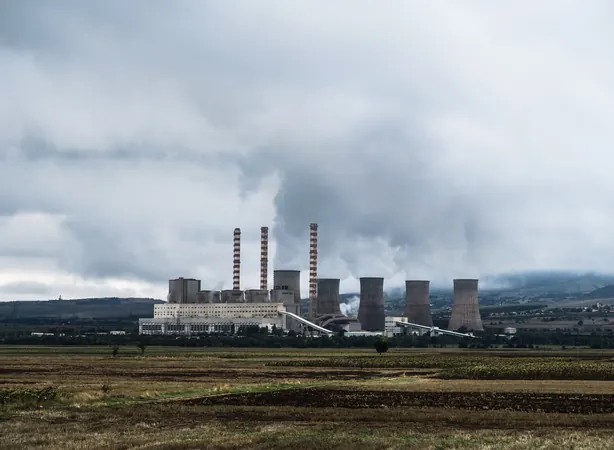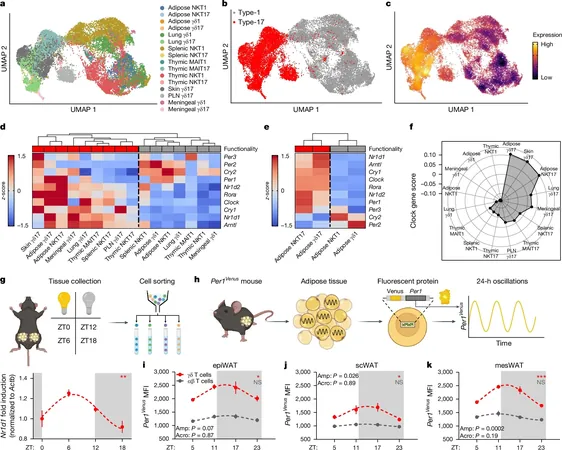
Urgent Warning: Clean Air Act Threatened by Political Agenda Risks Thousands of Lives
2024-10-25
Author: Jia
Introduction
Recent research published in the American Journal of Public Health has raised alarming concerns about the potential weakening of the Clean Air Act (CAA), reporting that air pollution control devices at power plants saved an astounding 9,100 lives and nearly $100 billion in health costs in the year 2023 alone. This crucial commentary sheds light on the immense public health benefits that stand to be compromised if the upcoming presidential administration adopts policies aimed at dismantling the CAA and curtailing the regulatory capabilities of the Environmental Protection Agency (EPA).
Collaboration and Study Findings
Experts from Boston University (BUSPH), the Sierra Club, the Institute for the Environment at the University of North Carolina at Chapel Hill, and Columbia University Mailman School of Public Health collaborated on this study, emphasizing that both the "Project 2025" initiative and the "America First Agenda" threaten to unravel decades of environmental protections. The CAA, enacted in 1970, has been instrumental in regulating air pollutants, and its erosion could lead to significant health crises across the nation.
Decline in Emissions
The researchers noted the remarkable decline in sulfur dioxide (SO2) and nitrogen oxides (NOx) emissions—by 93% and 87% respectively—from power plants between 1995 and 2022. This dramatic decrease has played a pivotal role in reducing coal-related deaths from 40,000 in 2000 to just 1,600 in 2020. The potential repercussions of rolling back such regulations are dire. If the aforementioned policy platforms are put into action, the use of pollution control devices (APCDs) could dramatically decrease, endangering public health.
Importance of the Clean Air Act
Dr. Jonathan Buonocore, an environmental health assistant professor at BUSPH and the lead author of the commentary, stressed the Clean Air Act's importance as a cornerstone of public health infrastructure in the U.S. He warned, “Protecting this act is vital, as it holds enormous implications for community health.”
Health Risks of Abandoning APCDs
In their analysis, the researchers modeled a hypothetical scenario in which existing APCDs were entirely abandoned. If this were to occur, SO2 reductions would be approximately 2.9 times lower and NOx reductions around 1.8 times lower, significantly increasing health risks associated with air pollution.
Impact of APCDs
The findings revealed that APCDs at power plants were responsible for capturing about 1.2 million tons of SO2 and 1 million tons of NOx emissions in 2023, preventing an estimated 3,100 to 9,000 early deaths and saving about $35 billion to nearly $100 billion in healthcare costs. These statistics highlight that power plants, once the largest sources of air pollution, have dramatically reduced their harmful emissions thanks to stringent federal policies.
Regional Health Benefits
As the researchers conclude, the strongest health benefits were associated with reductions at power plants primarily in regions like Appalachia, the Midwest, and the Mountain West, showcasing a clear correlation between regulatory success and public health improvements.
Consequences of Reduced Regulations
While outright elimination of APCDs is seen as unlikely, these new estimates outline the critical health stakes involved in the future of the Clean Air Act, urgently calling attention to the implications of any efforts to diminish the EPA's authority. The authors emphasize that any reduction in regulations could exacerbate racial and socioeconomic health inequalities, predominantly affecting communities of color and low-income populations who are already disproportionately vulnerable to environmental hazards.
Call to Action
The conversation is clear: Policies designed to diminish regulatory protections for air quality can have immediate and severe health impacts. Jeremy Fisher, a principal advisor on climate and energy for the Sierra Club, stated emphatically, “Lives are on the line; Americans deserve robust oversight of power plants, not weakened protections.”
Conclusion
Ultimately, air pollution policy is a public health imperative. The researchers warn that any move to roll back the Clean Air Act would not only have immediate consequences for air quality but potentially reverse years of progress towards a healthier future for all Americans. The upcoming political decisions will determine whether we collectively head toward a healthier environment or take a considerable step back.




 Brasil (PT)
Brasil (PT)
 Canada (EN)
Canada (EN)
 Chile (ES)
Chile (ES)
 España (ES)
España (ES)
 France (FR)
France (FR)
 Hong Kong (EN)
Hong Kong (EN)
 Italia (IT)
Italia (IT)
 日本 (JA)
日本 (JA)
 Magyarország (HU)
Magyarország (HU)
 Norge (NO)
Norge (NO)
 Polska (PL)
Polska (PL)
 Schweiz (DE)
Schweiz (DE)
 Singapore (EN)
Singapore (EN)
 Sverige (SV)
Sverige (SV)
 Suomi (FI)
Suomi (FI)
 Türkiye (TR)
Türkiye (TR)